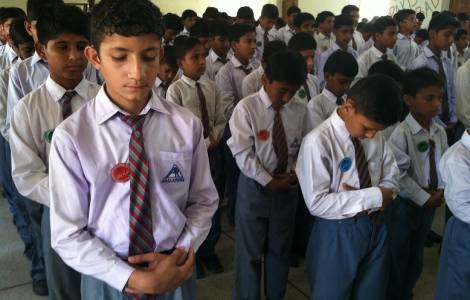
P.A.
Islamabad (Agenzia Fides) - Textbooks, educational programs and the education system in Pakistan fuel the promotion of intolerance and discrimination against religious minorities. The State, with a Muslim majority, has created an environment in which non-Muslims are considered "second-class citizens", with fewer rights and privileges. Their patriotism is questioned and their contribution to society is ignored. This is what is stated in the new report "Faith and a Future: Discrimination on the Basis of Religion or Belief in Education", a report published by the Christian-inspired NGO "Christian Solidarity Worldwide" (CSW). The Report explores violations of the right to freedom of religion or belief in educational settings in five countries: Burma, Iran, Mexico, Nigeria and Pakistan.
In particular, in Pakistan - states the text sent to Agenzia Fides - textbooks are written "to create a monolithic image of Pakistan as an Islamic state and of Pakistani citizens only as Muslims", effectively excluding non-Muslims from national identity and failing to "recognize and celebrate Pakistan's religious and ethnic diversity". The Report recalls that during the 1980s the then-dictator General Zia-ul-Haq initiated a process of Islamization of the nation, giving education an ideological orientation, and making Islamic ideology permeate the thinking of new generations. All this is explained, to remodel society according to Islamic principles. The effects of this operation "are still felt everywhere in society, particularly within the educational system", reads the text of the CSW.
Sikhs, Hindus, Christians, Ahmadis and other religious minorities suffer from severe violations of religious freedom in this context. Programs, for example, are full of derogatory content and language towards religious minorities; there are discriminatory attitudes towards non-Muslim teachers and students and attempts of conversion to Islam; minority students – denounces the Report sent to Fides - are habitually subjected to physical and psychological abuse, including ill-treatment and bullying.
Catholic Cecil Chaudhry, Executive Director of the National Commission for Justice and Peace (Pakistan), commenting on the institutional framework, said: "This intolerance has threatened the entire social fabric of our nation. It is necessary to address the biased education system in Pakistan".
The right to education is enshrined in Pakistan by the 1973 Constitution. Over 6.5 million children are not currently enrolled in primary school and another 2.7 million are not enrolled in secondary school. The drop out rate is high and the national action plan, developed in 2013, failed to improve the overall data. According to UNESCO, education in Pakistan is often of extremely low quality, and there is a need to increase the investment of public spending (currently at 2.8% of the GDP). The theme of education and the reform of the educational system is one of the topics that is addressed in the electoral campaign, given that the political elections are scheduled for July 2018. (PA) (Agenzia Fides, 2/3/2018)